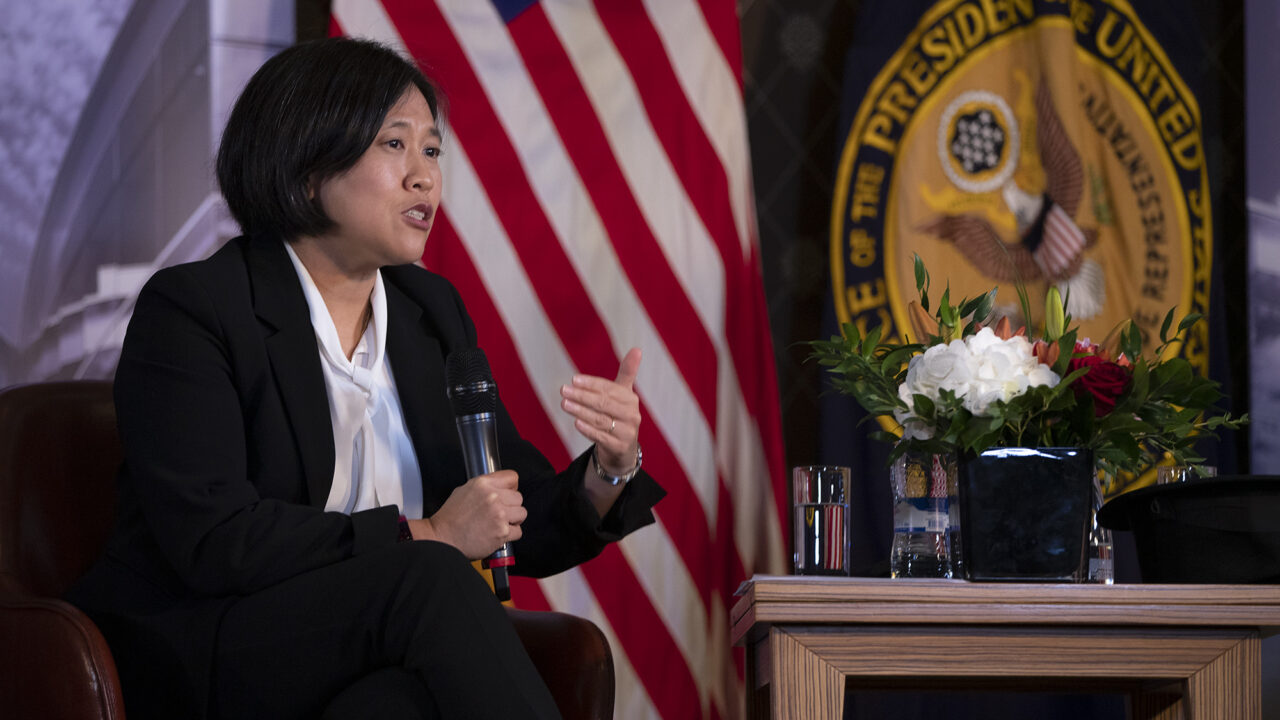 · Title: “USTR Ambassador Tai gives keynote in Geneva on the future role of the WTO”
· Creator: “United States Mission Geneva“— https://flickr.com/photos/us-mission/
· Source: “USTR Ambassador Tai gives keynote in Geneva on the future role of the WTO“—https://flickr.com/photos/us-mission/51590723127/in/photolist-2mATU8E-2mATUo9-2mATUxc-2mAZfYD-2mAYawb-2mATUQS-2mB2yiF-2mAZhQ9-2mB2z98-2mAZjJV-2mAZiDy-2mAYckg-2mB3LKU-2mATWAk-2mB3LxK-2mAYdeL-2mATToU-2mATT7g-2mAZfNJ-2mAZibz
· License: “CC BY-ND 2.0”—https://creativecommons.org/licenses/by-nd/2.0/
· Title: “USTR Ambassador Tai gives keynote in Geneva on the future role of the WTO”
· Creator: “United States Mission Geneva“— https://flickr.com/photos/us-mission/
· Source: “USTR Ambassador Tai gives keynote in Geneva on the future role of the WTO“—https://flickr.com/photos/us-mission/51590723127/in/photolist-2mATU8E-2mATUo9-2mATUxc-2mAZfYD-2mAYawb-2mATUQS-2mB2yiF-2mAZhQ9-2mB2z98-2mAZjJV-2mAZiDy-2mAYckg-2mB3LKU-2mATWAk-2mB3LxK-2mAYdeL-2mATToU-2mATT7g-2mAZfNJ-2mAZibz
· License: “CC BY-ND 2.0”—https://creativecommons.org/licenses/by-nd/2.0/
The Office of the U.S. Trade Representative (USTR) submitted comments to the Canadian government advocating against the northern neighbor’s proposed Digital Services Tax (DST) on American technology companies. The Biden Administration must push back against this discriminatory and damaging tax.
The comments follow plans by Canada to impose a three percent tax on the corporate income of foreign digital companies, the majority of them based in the United States, beginning in 2024. It is estimated that such a tax would result in $3.4 billion in revenue for the Canadian government over five years, at the expense of businesses and consumers.
DSTs present a grave danger to tax competition and economic growth globally, especially in the United States. By design, the revenue threshold for the applicability of DSTs is set to exclusively target successful American companies such as Apple, Google, Amazon, and Meta. This tax will result in higher costs for large swaths of Americans and Canadians alike, is hurting innovation and the consumer experience.
DSTs have been proposed by many countries around the world on a unilateral basis, resulting in numerous Section 301 investigations by USTR. As noted in a December 2021 statement by USTR Spokesperson Adam Hodge, “USTR continues to strongly oppose any new DSTs adopted by our trading partners.” ATR also wholeheartedly opposes these foreign DSTs and has in the past sent letters of opposition to USTR on the topic.
The problem with USTR’s most recent comments is that, while they correctly opposed discriminatory unilateral DSTs, they simultaneously endorsed the harmful global corporate minimum tax agreement proposed by the Organisation for Economic Co-operation and Development (OECD).
The agreement, if implemented, would form a global tax cartel to force corporate tax rates in every country to at least 15% while globalizing standards for the implementation of taxes and regulations. The OECD’s proposal would again harm tax competition, hamper innovation and investment, and damage America’s strongest businesses. In July, ATR joined 75 other advocacy groups from 40 countries around the world in urging Congress to reject this global minimum tax cartel in order to protect workers and consumers.
USTR should continue to oppose harmful tax proposals like Canada’s Digital Services Tax but must cease their advocacy for proposals that would strip America’s tax sovereignty like the OECD’s global minimum tax agreement.

